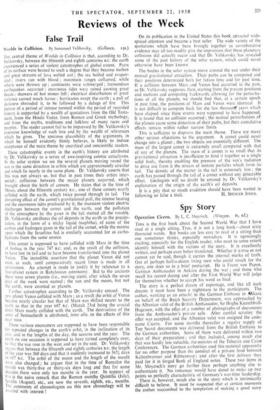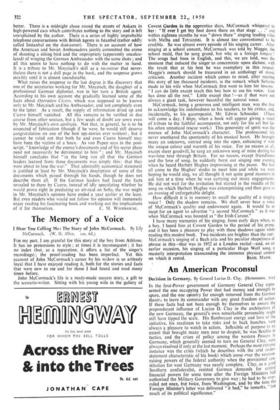Spy Story
Operation Cicero. By L. C. Moyzisch. (Wingate. Bs. 6d.)
THIS is the first book about the Second World War that I have read at a single sitting. True, it is not a long book—about sixty thousand words. But books are less easy to read at a sitting than one sometimes thinks, especially nowadays. It is agonisingly exciting, especially for the English reader, who must to some extent identify himself with the victims of the story. It is excellently written, and perhaps even better translated. Whether it is true or not cannot yet be said, though it carries the internal marks of truth. Out of perhaps half-a-dozen living men who could vouch for the story, one does so in a brief postscript. He is Franz von Papen, German Ambassador in Ankara during the war ; and those who recall his record during and after the First World War will judge for themselves whether to accept his word as final.
The story is a perfect dream of espionage, and like all such dreams it must have been a nightmare to the participants. The author, working as an attaché in the German Embassy in Mikara on behalf of the Reich Security Department, was approached by the Albanian valet of the British Ambassador, Sir Hughe Knatchbull- Hugessen, with the offer of a number of photographs of documents from the Ambassador's private safe. After careful scrutiny the offer was accepted, and the Albanian valet was assigned the code- name Cicero. For some months thereafter a regular supply of Top Secret documents was delivered from the British Embassy to the German authorities. Some of them were delivered within two days of their preparation ; and they included, among much else that was hardly less valuable, the minutes of the Teheran and Cairo
Conferences. The German authorities used this material apparently for no other purpose than the conduct of a private feud between Kaltenbrunner and Ribbentrop ; and after the first delivery they paid for it in forged Bank of England notes. These two items in Mr. Moyzisch's story go further than perhaps anything else to authenticate it. No romancer would have dared to make up two points so perfectly characteristic of Germany's war-time leadership. There is, however, much else in the story which is intrinsically difficult to believe. It must be suspected that at certain moments the author succumbed to the temptation of making a good story
better. There is a midnight chase round the streets of Ankara in high-powered cars which contributes nothing to the story and is left unexplained by the author. Theie is a series of highly improbable telephone conversations with British agents in Istanbul (rather oddly called Instanbul on the dust-cover). There is an account of how the American and Soviet Ambassadors jointly committed the crime of shooting a sitting bird and the impropriety (apparently uncalcu- lated) of winging the German Ambassador with the same shots ; and all this seems to have nothing to do with the matter in hand. It is a tribute to Mr. Moyzisch's skill as a raconteur that never- theless there is not a dull page in the book, and the suspense grows steadily until it is almost unendurable.
What raises the suspense to the last degree is the discovery that one of the secretaries working for Mr. Moyzisch, the daughter of a professional German diplomat, was in her turn a British agent. According to his own account she gradually learned some of the facts about Operation Cicero, which was supposed to be known only to Mr. Moyzisch and his Ambassador, and not completely even to the latter. As a result, the supply of information dried up and Cicero himself vanished. All this remains to be verified in due course from other sources, but a few seeds of doubt are sown even by Mr. Moyzisch's own apologia. Not that, in general, he is to be suspected of fabrication (though if he were, he would still deserve congratulation on one of the best spy-stories ever written) , but it cannot be ruled out that both he and even Cicero himself may have been the victims of a hoax. As von Papen says in the post- script, " knowledge of the enemy's documents and of his secret plans need not necessarily be detrimental to him " ; and Mr. Moyzisch himself concludes that " in the long run all that the German leaders learned from those documents was simply this: that they were about to lose the war." That admirably economical statement is justified at least by Mr. Moyzisch's description of some of the documents which passed through his hands, though he does not describe them all. If the German leaders had faced the facts revealed to them by Cicero, instead of idly speculating *hether he would prove right in predicting an air-raid on Sofia, the war might in Mr. Moyzisch's opinion have ended a year earlier at the least. But even readers who would not follow his opinion will immensely enjoy reading his fascinating book and working out the implications







































 Previous page
Previous page